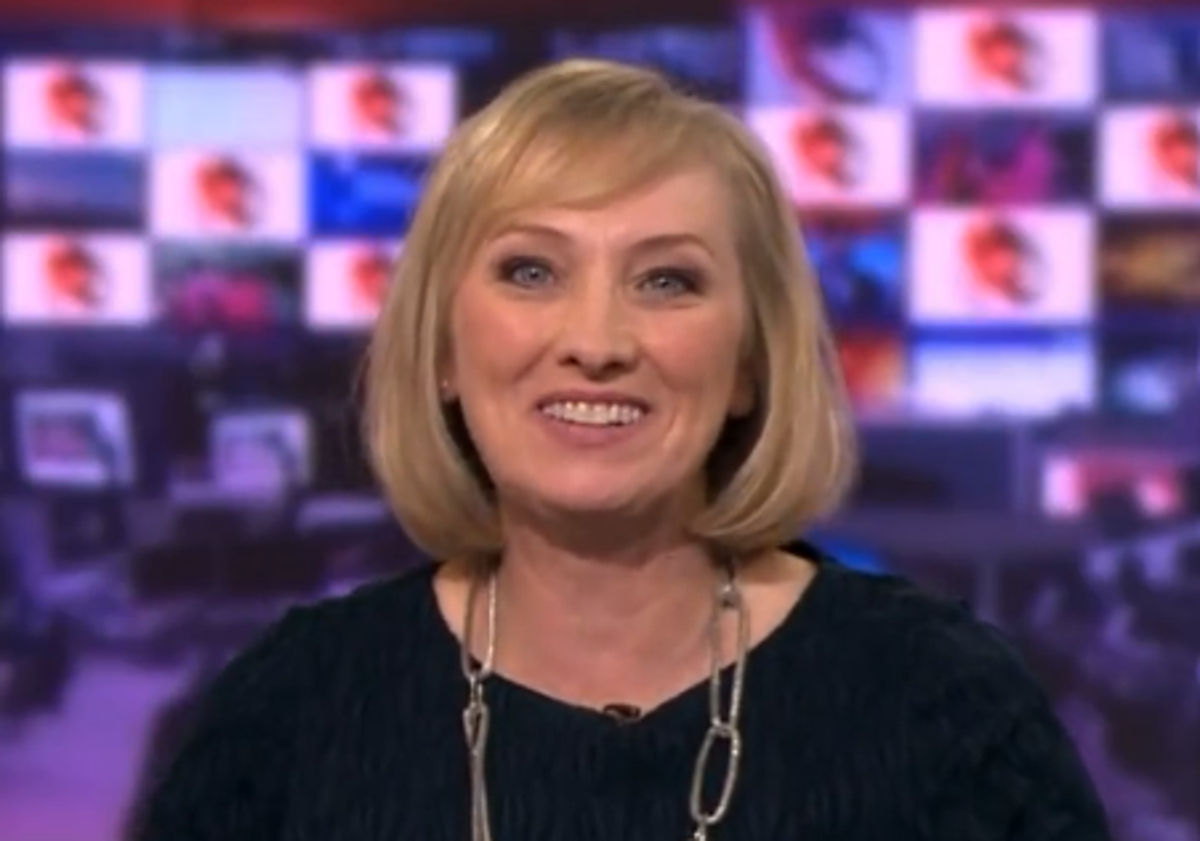Three prime ministers in two months... no wonder the BBC can’t keep a straight face

- Oops!Something went wrong.Please try again later.
- Oops!Something went wrong.Please try again later.
You’re watching the BBC News at 10, and everything’s gone bloody bats*** mental,” newsreaders may have wanted to say, but have not. For months now – years, even – broadcasters have been heroically reporting on the unfolding chaos of our political world without giving any hint of their own thoughts or feelings. They must tell us the unprofessional things the government has been doing while always remaining consummately professional. But levels of dysfunction within the Tory party have recently reached a high watermark, and some of the on-screen poker faces have slipped. And, frankly, who could blame them?
How, for example, could BBC newsreader Martine Croxall not get the giggles, late on Sunday night, when telling us that Boris Johnson wouldn’t stand in the leadership contest? His David Brent-esque return from the Dominican Republic to try and reclaim his old job had flopped beautifully, and the human response was to find that deeply funny. On Channel 4 News, Krishnan Guru-Murthy called Steve Baker “a c***” in a hot mic moment, after a “robust” interview with the Tory MP. I doubt it was the first time that the outspoken Brexiteer Baker has been called this word.
Of course, presenters are not supposed to do these things. Instead, political editors and correspondents tell us, ad nauseum, that it’s “a momentous day”. That Westminster is “febrile”. Or that a week/day/hour “is a long time in politics”. Unfortunately, everything has been momentous or febrile for such a long time that these now-clichéd words barely fulfil their function. The only thing that has really captured the spirit of these times is the much memed clip of Brenda from Bristol screeching, “Oh for God’s sake – not another one!” at Theresa May calling an election in 2017. Yes, 2017. Since then, we’ve had three PMs. Brexit. The pandemic. A crashed economy. Partygate. Dominic Cummings’ drive to Durham. Oh, and that time that Matt Hancock, caught in an arse-grabbing office clinch, killed sex forever. How can anyone not be incredulous or hysterical?
The truth is, these unguarded moments of authentic frustration or humour make great telly. The debate about impartiality is not only out of sync with these volatile times, but incredibly patronising – as though there will be a left-wing uprising unless all news is delivered to the public with cold, blank stares. Plus, when our politicians’ behaviour hasn’t reached Benny Hill levels of farce, it has been bad-natured. Should Emily Maitlis really have been disciplined for her straight-talking Newsnight monologue about Dominic Cummings’ rule-breaking? And was it really appropriate for BBC Breakfast’s Naga Munchetty to be censured for sharing her personal experiences of racism in response to a racist statement by Donald Trump? Under these circumstances, the departures of Maitlis, Andrew Marr, Jane Garvey and Fi Glover to outlets where they can speak more freely do not seem unexpected.
The strange thing is, no one complained when broadcasters recently showed human emotion after the death of the Queen. In fact, they were praised for it – some of it was spine-tingling, history-making telly. Who could forget the crack in Huw Edwards’ voice as he delivered the news on the BBC? Or Mary Nightingale on ITV, speaking shakily as she fumbled around for the official statement? Or Kirsty Young’s highly emotional sermon at the end of the funeral?
Some events are too big for straight, unemotional faces. The Queen’s death was one of them, and so is the intense chaos of our current government. It isn’t party political to struggle with that. Perhaps, in fact, it’s not that broadcasters have broken impartiality – but that the Tory Party has broken our broadcasters.

